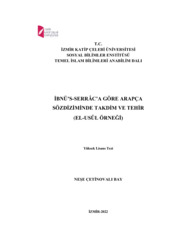İbnü's-Serrâc'a göre Arapça sözdiziminde takdim ve tehir (el-Usûl örneği) Fronting and delaying in Arabic syntax according to Ibn Sarrāj (The example of al-Usul)
-
Eser Sahibi
Çetinovalı Bay, Neşe
- Tez Danışmanı Eyüp Akşit
-
Tür
Yüksek Lisans
- Yayın Tarihi 2022
-
Yayıncı
İzmir Katip Çelebi Üniversitesi Sosyal Bilimler Enstitüsü
- Tek Biçim Adres https://hdl.handle.net/11469/3138
-
Konu Başlıkları
Dilbilgisi - Arap Dili
Arapça - Sarf - Söz dizimi
Sözdizimi
ÖZETDil
birbiriyle yakından ilişkili ses, biçim, sözdizimi ve anlamdan mürekkep bir yapıdır. Bu karmaşık yapının en önemli bileşeni ise sözdizimidir. Cümlenin bütün ögelerini bir defada söylemek mümkün değildir. Bazı ögeleri önce, bazısı da sonra söylenir. Her dilin kendine has bir sözdizimi kuralları vardır. Sözdiziminin temel kuralları dilden dile değişmektedir. Her dilin sahip olduğu bu ilkeler bazı dillerde esnek, bazısında ise daha katı kurallar içerirler. Örneğin Arapça sözdizimi Türkçe sözdizimine göre daha katı kurallara bağlı olmasına rağmen İngilizce ile kıyaslandığında daha esnektir. Arapça sözdiziminde yeri değişmeyen ve değişebilen cümle ögeleri ve sözcük öbekleri vardır. Bu dilde cümleler genel olarak yapılarına göre fiil cümlesi ve isim cümlesi şeklinde ikiye ayrılır. Arapça fiil cümlesinde önce fiilin sonra öznenin sonra nesnenin gelmesi genel bir kuraldır. Ancak bazı durumlarda özne ile nesnenin yeri değişebilir. Mübteda (özne) ve haber (yüklem)den oluşan Arapça isim cümlesinde ise önce mübteda sonra haberin gelmesi bir kuraldır. Ancak çeşitli nedenlerden dolayı önce haber sonrasında mübteda gelebilir. Klasik Arapça dilbilgisi kitaplarında dağınık bir şekilde ele alınan bu meseleleri Farabi (ö. 950 )'den aldığı mantık derslerinin etkisiyle İbnü's-Serrâc (ö. 929 ), sistematik hale getirir. İşte bu çalışma, Arap dilbilimci İbnü's-Serrâc'ın görüşleri doğrultusunda Arapça Sözdiziminde Takdîm ve Te'hîr yani cümlenin ögelerinin yer değiştirmesi olgusunu betimlemekte, tasnif etmekte ve analize tabi tutmaktadır. Ona göre Arapçada cümle ögelerinin yer değiştirmesi dilin yapısından kaynaklandığı gibi anlamsal gerekçelerle de yapılmaktadır. Dilin yapısından dolayı cümle ögelerinin yer değiştirmesinde cümlenin anlamında bir değişiklik görülmez. Ancak dilin yapısından kaynaklanmayan takdîm ve te'hirde ise cümlenin anlamı da doğal olarak bu durumdan etkilenmektedir. Anlama dayalı takdîm-te'hirin bir kısmı sözceleme ediminde konuşmacının niyetiyle ilgilidir. Konuşan, önem verdiği ögenin yerini vurgu vb. gayelerle değiştirebilmektedir. Ayrıca şiirsel zaruretlerin yanı sıra dinleyende estetik bir zevk oluşturmak için de konuşucu cümle ögelerinin yerini değiştirmektedir.ABSTRACTLanguage is a structure consisting of sound, form, syntax, and meaning that are closely associated with each other. The most important component of this complex structure is syntax. Since it is not possible to say all the elements of a sentence at once, one needs to say some of them first and some of them later. That is why each language has its own syntactic rules. The basic rules of syntax vary from language to language. These principles, which every language has, contain flexible rules in some languages and stricter ones in others. For instance, although Arabic syntax is more flexible compared to English syntax, it is more strictly regulated than Turkish syntax. In Arabic syntax, the positions of some of the sentence elements and phrases in the word order can change when some cannot. In Arabic, sentences are generally categorized into two groups depending on their structure: verbal sentences and nominal sentences. The general rule is that the verb comes first, then the subject, then the object in the Arabic verbal sentence. However, in some cases, the position of the subject and the object may switch places. In the Arabic nominal sentence consisting of Mubtada (Subject) and Khabar (Predicate), Mubtada comes first and then Khabar. Yet for various reasons, the Khabar may come first, and then the Mubtada. Inspired by the logic lessons he took from Al-Farabi (died 950), Ibn al-Sarraj (died 929), systematizes these topics that are handled in a disorganized manner in the classical Arabic grammar books. This study describes, classifies, and analyzes the phenomena of taqdim wa-ta'hir meaning the displacement of sentence elements in Arabic Syntax. According to him, the displacement of sentence elements in Arabic occurs due to the structure of the language, as well as on semantic grounds. Owing to the structure of the language, there is no change in the meaning of the sentence when the sentence elements are displaced. However, in the cases of taqdim wa-ta'hir which do not occur due to the structure of the language, the meaning of the sentence is naturally affected by the displacement. Some taqdim wa-ta'hir cases are about the intention of the speaker during the enunciation performance. The speaker can change the position of the element that is important to him/her with a purpose such as emphasis. Also, the sentence elements can be displaced for poetic concerns or to give aesthetic pleasure to the listener.
-
Koleksiyonlar
ENSTİTÜLER
SOSYAL BİLİMLER ENSTİTÜSÜ

 Tam Metin
Tam Metin

